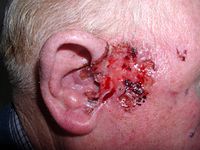
Photo from wikipedia
Rectal neuroendocrine carcinomas (rNECs) are poorly characterized and, given their aggressive nature, optimal management is not well-established. We therefore sought to describe clinicopathologic traits, treatment details, and survival patterns for… Click to show full abstract
Rectal neuroendocrine carcinomas (rNECs) are poorly characterized and, given their aggressive nature, optimal management is not well-established. We therefore sought to describe clinicopathologic traits, treatment details, and survival patterns for patients with rNECs. Patients captured in the National Cancer Database (NCDB; 2004–2016) with rNECs managed with observation, chemotherapy, or proctectomy ± chemotherapy were considered for analysis. The inclusion criteria were met by 777 patients. Mean age was 62.4 years, 45% were male, 80% were Caucasian, 40% presented with lymph nodes metastases, and 49% presented with distant metastases. Chemotherapy and surgical resection were administered in 72 and 19% of cases, respectively. Median overall survival (OS) was 0.83 years (1 year, 41%; 3 years, 13%; 5 years, 10%). During the study interval, 659 (85%) patients died, with a median follow-up of 0.79 years. On multivariable analysis, age ≥60 years, male sex, and distant metastases were associated with worse survival; surgical resection and administration of chemotherapy were associated with a reduced risk of death. Among non-metastatic patients treated with surgical resection, administration of chemotherapy was protective, while a positive lymph node ratio (LNR) ≥42% (median value) was associated with an increased risk of death. There was no difference in the number of examined lymph nodes between LNR cohorts. Patients with rNECs experience dismal survival outcomes, including those with non-metastatic disease treated with curative-intent surgical resection. Neoadjuvant therapy can serve as a useful biologic test, and surgical resection should be judiciously employed.
Journal Title: Annals of Surgical Oncology
Year Published: 2021
Link to full text (if available)
Share on Social Media: Sign Up to like & get
recommendations!